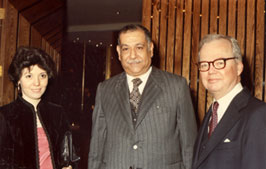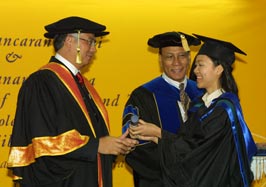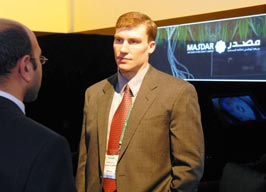The MIT Technology and Development Program

Within the newly industrialized world, science and technology were once considered a luxury — a secondary consideration in the scope of overall economic development. This is no longer the case. Technology has become a commodity on the global market, and a key to the solutions essential to economic growth in the emerging world.
The establishment of a research-based science and technology infrastructure is now a critical component in the economic development of any nation. The Technology and Development Program works to facilitate this development.
In close cooperation with local academic institutions, governmental organizations, and industry, TDP forges the relationships that enable graduate level, research-based science and technology centers of learning, developed and shaped by the human capacity from within the culture they serve.
How we work
The process is complex, and dependent on the individual circumstances each country, each initiative has to face. At the invitation of academic institutions, working with local government, TDP supports the establishment of graduate-level research and educational facilities.
From the start, TDP establishes relationships of cooperation with academic institutions, local government, and industry and works to ensure government supported research facilities are privately managed and independent of governmental administration.
We share our knowledge, providing guidance and assistance in the scholarly assessment of curriculum and top tier faculty. TDP sets a level of quality control in the establishment of these intellectual centers that ensures the development stream essential for the critical thinking necessary for these endeavors. Our organization is lean and agile, flexible to the independent situations and university relationships we cultivate.
The philosophy behind TDP
Long term and sustaining development of newly industrialized countries requires a highly trained cadre of people equal to the task. It requires a governmental relationship independent of state authority, with a free-flow of information through all parties cross-platform, working together to address the questions in need of answer.

The Technology and Development Program provides a critical presence in the formation of the research-based academic communities that foster such change. Our work enables a building and augmenting of an appropriate science and technology infrastructure and the initiation and forging of relationships essential for a sustaining solution.
A university cannot stand alone.
It is for this reason that TDP endeavors to create an atmosphere of understanding and solutions-based guidance within the existing academic and cultural infrastructure of newly industrialized states. These are countries faced with both practical and intellectual challenges that require real-world structural answers. We offer our knowledge in the development of the intellectual question askers and problem-solving leaders who could play transitional roles in the country as a whole. We work to foster the creation of communities determined to answer the questions these countries face, in an atmosphere of academic, industrial, and governmental cooperation.
What we've learned
Our work has grown. Initial forays into Latin America led to the introduction of structural changes enabling a rural electricity system in Colombia. In East Africa, TDP's work— in training and establishing local manpower with the Ethiopian Transportation Department — allowed a country divided by geography to meet.
From Egypt to Malaysia and now in Abu Dhabi, TDP has learned much.
We know a cooperative program has to have a critical mass. One or two small projects cannot facilitate change. Every element — academia, government, industry — must participate and share a common goal.

Our projects demand a 'champion' from the country they serve; a person or a team from local government, industry, or academia. One who will act as a strong facilitator, a visionary, and a partner. A person — or a team of people — who will engage local parties, and encourage the project long after our participation is needed.
Successful work requires a multi-year commitment, in order to build and develop the infrastructure to ensure our work will sustain — and a commitment of adequate resources from the participating countries and universities.
It is important that this funding be assured both for TDP to do its work, and for the institution that is established for the long term.
Imperative as well is the focus we bring to graduate research facilities in science and technology. It allows for more depth and complete, workable end results.
We believe that certain, non-financial incentives must be offered to accomplish our tasks. The promise of a compelling intellectual challenge — and academic support — for the students involved is necessary to create an atmosphere of collaboration, curiosity, and scholarship essential to solve problems. To accomplish this, all parties involved must remain committed to the vision of the project, its long-term objectives and the people who will bring that vision to life.
Building the Relationships that Sustain Development
Universities outside the United States are often isolated from government and industry relationships, inhibiting the growth of research and development through a lack of large scale funding.
Contracts between government, industry, and graduate-level research universities serve all parties in forwarding the socio-economic development emerging countries seek. The question, however, is how to develop this contract-based relationship.
Through courses, seminars, and conferences to local industry, government, and academics, local universities develop interdependency with industry and government and thus further broaden the understanding and implications of contractual research and development relationships. Resources available at MIT to help facilitate the outreach program include the MIT Professional Education Program, under the School of Engineering, as well as MIT's Industrial Liaison Program.
